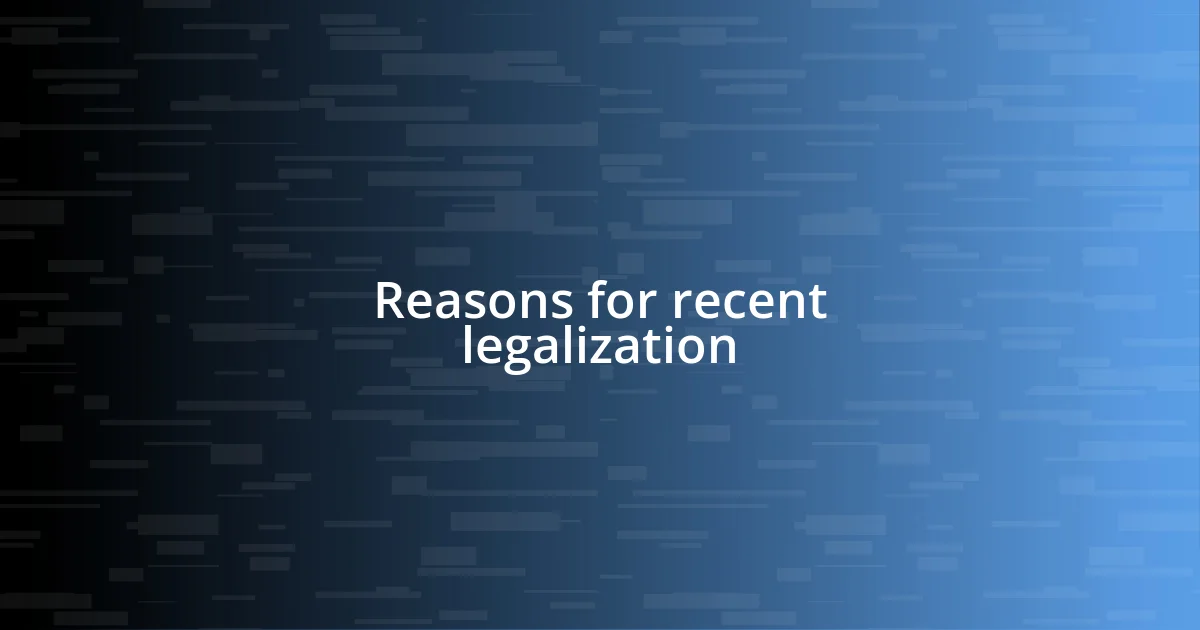Key takeaways:
- Changing societal attitudes are driving legalization trends, shifting the perspective of substances like cannabis from criminality to legitimacy for wellness and recreation.
- Legalization yields significant economic benefits, including job creation and increased tax revenues, which can be reinvested in public services like education and healthcare.
- Regulation enhances public health, allowing for informed consumer choices, fostering open conversations about responsible use, and shifting focus from punishment to education and prevention.

Overview of legalization trends
When I think about the recent trends in legalization, it’s hard not to feel a mix of excitement and curiosity. We’ve seen a shift in public perception, especially about cannabis and other previously prohibited substances. Conversations that once felt taboo are now not only commonplace but often celebrated.
It’s intriguing to see how these changes vary from one region to another. For instance, in places where cannabis has been legalized, I’ve noticed that local economies seem to thrive. Businesses flourish, and the benefits to tax revenue are hard to ignore. Isn’t it fascinating to consider how a simple shift in the law can transform lives and communities?
Reflecting on my experiences, I can’t help but ask: what does this really mean for society as a whole? Legalization often sparks debates about safety, responsibility, and addiction. In my view, these conversations are essential; they invite us to examine our relationship with substances and the policies governing them. Each trend carries the potential to redefine norms and values in our society, pushing us toward a future that embraces more open dialogue about choices and consequences.

Reasons for recent legalization
When I think about the reasons behind recent legalization trends, one striking factor stands out: changing societal attitudes. I remember when discussions around cannabis were mostly whispered in hushed tones, but that’s all changed. Now, more people openly share their experiences, seeing cannabis not as a criminal act, but as a legitimate choice for wellness and recreation. This shift has undoubtedly influenced lawmakers to reconsider outdated regulations.
Another reason that drives legalization is the potential for significant economic benefits. Having witnessed firsthand the vibrancy that legal cannabis markets can bring to communities, I feel a sense of optimism when I hear about new businesses sprouting up. The tax revenue generated from these industries is also hard to overlook; it can fund education, healthcare, and infrastructure projects. In this regard, legalization isn’t just a social issue; it’s an economic opportunity.
Lastly, there’s the impact of public health and safety concerns. The more I delve into conversations around legalization, the clearer it becomes that controlled regulation might actually reduce risks associated with substance use. By bringing these products into regulated spaces, authorities can impose age restrictions, quality controls, and safety measures that simply aren’t possible in underground markets. Doesn’t it make sense for us as a society to prioritize safety over prohibition?
| Reason | Explanation |
|---|---|
| Changing Societal Attitudes | Public perception has shifted, making discussions about legalization more open and accepted. |
| Economic Benefits | Legalization leads to new business opportunities and increased tax revenues for public services. |
| Public Health & Safety | Regulation allows for better control over substance quality, leading to safer consumption practices. |

Impact on society and economy
Legalization brings tangible benefits to both society and the economy, which I find fascinating. For instance, in cities where cannabis has been legalized, I’ve observed a remarkable improvement in local business activity. It’s like a breath of fresh air; new shops pop up, and thriving markets emerge, creating a sense of vibrancy that many communities desperately need.
- Communities experience economic revitalization through new job creation.
- Tax revenues from legalized industries contribute to public services like education and infrastructure.
- Mental health awareness grows, as people seek legal avenues for wellness without stigma.
- Reduced criminal records allow individuals a chance to reintegrate into society, positively impacting social dynamics.
While chatting with a friend who runs a small business in a legalized area, I was struck by how much her sales have grown, thanks to tourists and locals alike eager to explore this new culture. It’s not just about commerce; the entire atmosphere shifts. People feel more relaxed and open, which encourages a sense of community that extends beyond mere transactions. With the right regulations, I believe we’re fostering not just economic opportunity but a deeper sense of connection among individuals.

Legalization and public health effects
Thinking about the connection between legalization and public health effects, I can’t help but reflect on how regulation not only enhances safety but promotes informed choices. I recall a time when friends were oblivious to the quality of what they were consuming, often relying on sketchy sources. With legalization, there’s a newfound transparency in the market that enables consumers to understand exactly what they’re buying—lab-tested products, accurate dosage information, and comprehensive ingredient lists. Doesn’t it feel empowering to be able to make informed choices about what goes into our bodies?
Moreover, legalization has the potential to shift the focus of public health initiatives towards education and prevention rather than punishment. I remember attending a community seminar where health experts discussed responsible consumption patterns instead of fear-driven messaging. The atmosphere was supportive, fostering open discussions about mental health and the therapeutic benefits of substances like cannabis. It made me realize that sharing knowledge can lead to healthier lifestyles, as opposed to relying on outdated stigmas that only breed ignorance.
It’s intriguing to think about how legalization doesn’t just affect individual choices, but also opens the door for broader health conversations. I often reflect on my own experiences with wellness; having access to regulated products has encouraged me to explore holistic approaches to health without shame. There’s a sense of relief in knowing that I’m part of a community that prioritizes well-being and informed decision-making over the fear and stigma of the past. This cultural shift not only enhances individual lives but cultivates a society that embraces health and well-being.

Case studies of successful legalization
Examining the legalization of cannabis in Colorado serves as a compelling case study. I remember reading about the first year post-legalization, where tax revenue exceeded $70 million, funding crucial areas like education and infrastructure. Isn’t it remarkable how a simple policy change can inject such vibrancy into public services? The figures spoke volumes, reflecting not just financial benefits but a community’s reinvention.
Similarly, the impact of legalization in Canada is noteworthy. It struck me how the government launched public awareness campaigns that emphasized responsible use while also addressing mental health. When I learned about the local outreach initiatives aimed at younger audiences, I couldn’t help but feel hopeful. This proactive approach illustrates how education can replace stigma, guiding individuals toward healthier decisions in an informed context.
Lastly, I find California’s recent shifts in legislation particularly enlightening. Having visited San Francisco post-legalization, I was intrigued by the cultural shift I witnessed—artisanal cannabis cafes and wellness events emerging everywhere. It’s as if legalization has allowed people to explore new narratives around cannabis, fostering community connections. How often do we see social movements that not only celebrate diversity but also encourage dialogues about mental health? This is a testament to how legalization can empower not just economies but also enrich our everyday lives.

Future predictions for legalization
The future of legalization is likely to be shaped by ongoing shifts in public perception and policy. I often think about how younger generations, raised in a more open dialogue about substances, will drive demand for further reforms. Isn’t it fascinating to imagine a world where this new mindset encourages lawmakers to consider regulations that destigmatize a wider range of previously forbidden items?
As we look ahead, I can’t help but feel optimistic about potential new legislation embracing psychedelics for therapeutic use. I remember discussing with a friend how studies are showing promising results in mental health treatments with substances like psilocybin. Imagine a future where individuals struggling with depression or anxiety could find relief through guided sessions in a safe and regulated environment. This adds a profound layer to what legalization could bring to healthcare.
What’s equally interesting is how international trends could influence the United States. I have seen countries like Portugal move towards decriminalization with positive results in addiction rates. If U.S. policymakers take cues from these successful models, we may soon enter an era of not just legalization, but a comprehensive view of drug policy reform. It makes me wonder: what kind of societal impact could result from such progressive thinking? The possibilities seem endless.

How to engage with legalization movement
When engaging with the legalization movement, I find it essential to educate myself and others about the issues at hand. Just a few months ago, I joined a local discussion group focused on cannabis legalization. Listening to diverse perspectives opened my eyes to the nuances of the debate, like how affected communities can leverage legalization for social equity. Have you ever stopped to consider how these conversations can shape attitudes and create allies?
I also believe in the power of grassroots initiatives. Recently, I volunteered for a campaign advocating for marijuana reform in my city. The energy was contagious, and I was struck by how a simple conversation at a community event can spark interest and mobilize support. It’s amazing how sharing personal stories of impact can resonate with others—how have you approached sharing your views to inspire change within your circle?
Lastly, utilizing social media to raise awareness can be incredibly effective. I remember posting about my own experiences and thoughts on legalization. The feedback was surprising; it opened doors to discussions I never expected. Engaging in these online platforms can amplify voices and connect like-minded individuals. Don’t you think harnessing technology makes it easier than ever to foster a collective movement?














